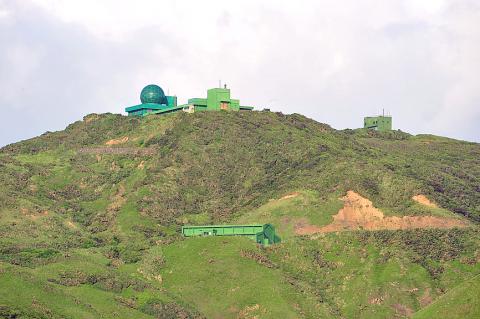Military officials said China has stepped up espionage around Taiwan’s sensitive defense installations in recent weeks, with Chinese intelligence operatives posing as tourists to take photographs and gather information at Jioupeng Military Base (九鵬基地) in the south.
The latest incident occurred on Friday last week, the day before the meeting between President Ma Ying-jeou (馬英九) and Chinese President Xi Jinping (習近平) in Singapore, when a Chinese tourist was stopped from taking closeup pictures of technical staff and officers in uniform at several restaurants just outside of Jioupeng Military Base, which is on a hill overlooking the Pacific Ocean in Pingtung County’s Manzhou Township (滿州).
A military official who requested anonymity said there were numerous incidents of suspected espionage activities around Jioupeng, a base that houses the nation’s most advanced guided missiles and a vital installation for missile test-fire launches, by Chinese who were taking photographs in the area, some carrying sophisticated cameras and photography equipment.

Photo: Tsai Tsung-hsien, Taipei Times
The timing of their activities was judged to be too much of a coincidence, because the technical and operational staff at the Jioupeng base were busy conducting various scheduled missile firing and flight tests from Oct. 21 to Friday, with two daily sessions in the morning and in the afternoon, the military official said.
In light of Xi’s remark in Singapore that more than 1,000 missiles in China’s southeast provinces were not aimed at Taiwan, the official said: “It is appalling that China is playing a two-faced tactic to deceive us. Chinese officials said they want to reduce cross-strait hostilities, but they are actively spying on our most important missile base.”
“Opening up our nation’s tourism to independent travelers from China has caused too much trouble for our military installations,” he said.
The Chinese man in Friday’s incident spoke with a Cantonese accent and said he was an independent tourist traveling around Taiwan when questioned by military officers after taking pictures of uniformed personnel.
The officers found he had taken many close-up photographs, including ones of name tags, of technical staff and military officers from the base. He was forced to delete those pictures, then released.
In the first week of this month, a local resident reported to authorities that an unidentified person carrying sophisticated photography equipment had driven to a hill opposite the Jioupeng base and pointed his camera at base installations.
When local police arrived in their cruiser, the man sped off.
There were also incidents reported of Chinese tourists “playing” with drones that have cameras on them outside the Jioupeng base last month.

Taiwan is gearing up to celebrate the New Year at events across the country, headlined by the annual countdown and Taipei 101 fireworks display at midnight. Many of the events are to be livesteamed online. See below for lineups and links: Taipei Taipei’s New Year’s Party 2026 is to begin at 7pm and run until 1am, with the theme “Sailing to the Future.” South Korean girl group KARA is headlining the concert at Taipei City Hall Plaza, with additional performances by Amber An (安心亞), Nick Chou (周湯豪), hip-hop trio Nine One One (玖壹壹), Bii (畢書盡), girl group Genblue (幻藍小熊) and more. The festivities are to

Auckland rang in 2026 with a downtown fireworks display launched from New Zealand’s tallest structure, Sky Tower, making it the first major city to greet the new year at a celebration dampened by rain, while crowds in Taipei braved the elements to watch Taipei 101’s display. South Pacific countries are the first to bid farewell to 2025. Clocks struck midnight in Auckland, with a population of 1.7 million, 18 hours before the famous ball was to drop in New York’s Times Square. The five-minute display involved 3,500 fireworks launched from the 240m Sky Tower. Smaller community events were canceled across New Zealand’s

‘IRRESPONSIBLE’: Beijing’s constant disruption of the ‘status quo’ in the Taiwan Strait has damaged peace, stability and security in the Indo-Pacific region, MOFA said The Presidential Office yesterday condemned China’s launch of another military drill around Taiwan, saying such actions are a “unilateral provocation” that destabilizes regional peace and stability. China should immediately stop the irresponsible and provocative actions, Presidential Office spokeswoman Karen Kuo (郭雅慧) said, after the Chinese People’s Liberation Army (PLA) yesterday announced the start of a new round of joint exercises around Taiwan by the army, navy and air force, which it said were approaching “from different directions.” Code-named “Justice Mission 2025,” the exercises would be conducted in the Taiwan Strait and in areas north, southwest, southeast and east of Taiwan

‘SLICING METHOD’: In the event of a blockade, the China Coast Guard would intercept Taiwanese ships while its navy would seek to deter foreign intervention China’s military drills around Taiwan this week signaled potential strategies to cut the nation off from energy supplies and foreign military assistance, a US think tank report said. The Chinese People’s Liberation Army (PLA) conducted what it called “Justice Mission 2025” exercises from Monday to Tuesday in five maritime zones and airspace around Taiwan, calling them a warning to “Taiwanese independence” forces. In a report released on Wednesday, the Institute for the Study of War said the exercises effectively simulated blocking shipping routes to major port cities, including Kaohsiung, Keelung and Hualien. Taiwan would be highly vulnerable under such a blockade, because it